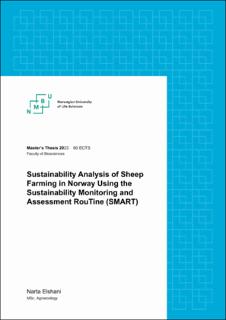| dc.description.abstract | Sheep production systems in Norway present complexity in the same way as other systems partaking in the climate challenges. Sustainability of these systems cannot be defined through single-impact indicators; hence a broader range of sustainability dimensions and trade-offs must
be assessed. The present research uses the Sustainability Assessment and Monitoring RouTine (SMART): a multi-criteria sustainability assessment based on the Sustainability Assessment of Food and Agriculture Systems (SAFA) Guidelines which gathers data on the farms’
performance through 327 indicators across 4 dimensions. Eight sheep farms in Norway were selected for assessment: four low-land coastal farms, and four inland mountain farms.
Management practices which support sustainability were identified in all farms: high animal welfare, high number of days of access to pasture for the livestock, no/low use of synthetic chemicals, good water management, and high quality of life for farmers. Management practices
which hinder sustainability and key areas for improvement were also identified: increased on-farm energy production, decreased use of externally sourced concentrate feed, and increased farmers’ knowledge about externally sourced inputs. Some differences between the coastal and inland farms were also identified which were related to number of days of access to pasture for livestock, water consumption, participation for farmers in trainings and additional education, and political involvement. Using the SMART-Farm tool aided the process of identifying practices and systematically evaluating them through a global sustainability perspective.Aggregated results from the SMART-Farm assessment indicated a high degree of goal achievement across dimensions. The farms scored on average above 80% on the Environmental Integrity and the Social Well-Being, and lower on the Economic Resilience and the Good Governance dimensions (76% & 71% respectively). To evaluate these results, a qualitative expert elicitation method was employed; this provided insight into shortcomings which were a result of the context-generic approach that the tool has and lack of inclusion of stakeholder participation in indicator selection and aggregation process. These shortcomings are important to consider when interpreting the results of numeral integration assessments which are used for decision-making. However, evaluating these scores was also a valuable outcome in itself since it uncovered knowledge gaps about the topic of sustainability of sheep farming in Norway. | |
